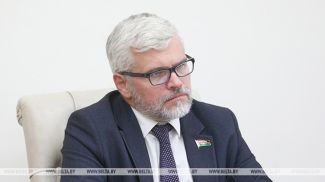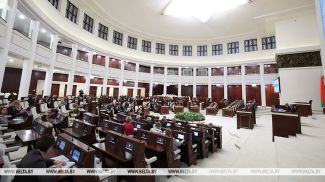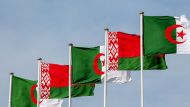
“We, the living, need this to prevent it from happening again,” Natalya Kochanova said. “Yesterday, when we visited the places where our civilians, children, women and prisoners of war were shot, we once again came in contact with that tragedy. Of course, we must pass it on from generation to generation. It brings great pain to see this. But we must realize that our people were simply exterminated so that they would not exist in this world. Memory is what unites us today as a nation.”
Memory is our moral integrity, the speaker added. “Moral integrity before those who were killed then. This is our memory of those who passed the crucible of that terrible tragedy. The memory of those who restored our towns and villages in the post-war hardships. The memory of those who created such a beautiful independent, sovereign Belarus in peacetime,” the chairperson of the Council of the Republic emphasized.
“Let everyone in the world know that the Belarusian people will never allow Nazism and fascism on their land. We will do everything to prevent this from happening in the future,” Natalya Kochanova said.
The Masyukovshchina War Memorial is a monument to prisoners of war and civilians who died during the Great Patriotic War in one of the largest concentration death camps Stalag-352 in the occupied territory of the former Soviet Union. In this camp, the Nazis used a particularly cruel system of torture and humiliation of human dignity. People were kept in inhuman conditions, in barns, barracks and stables. Big numbers of prisoners of war were brought there. They did not have enough space, and many of them, especially in the autumn and winter of 1941-1942, were kept in the open air, where almost immediately they died of cold, hunger and diseases. From July 1941 to 3 July 1944, more than 80,000 soldiers and officers of the Soviet Army who were taken prisoner as well as civilians brought to the camp from Minsk and surrounding villages died in Stalag 352. Apart from the citizens of the former Soviet Union, Italian soldiers and officers who fought against the Nazis on the side of the Soviet Union were also kept in the concentration camp from December 1943 to June 1944.













